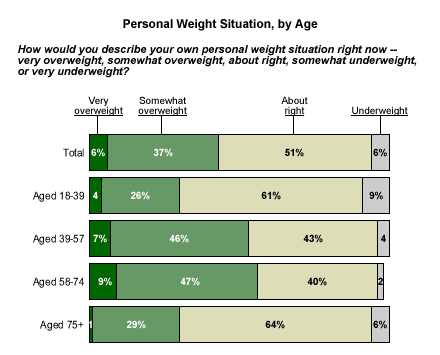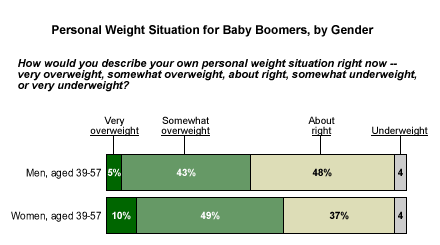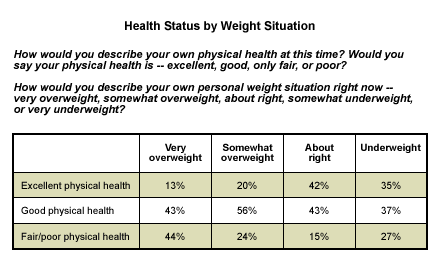This is the first in a series of articles on the health issues facing the "baby boomer" generation.
In a June 5 speech to the Commonwealth Club in San Francisco, Centers for Disease Control and Prevention Director Julie Gerberding reported that, in terms of controllable health factors, obesity is closing in on tobacco use as the leading cause of death in the United States, and needs to become a major priority for the U.S. healthcare system. Aggregated results from Gallup's annual Health and Healthcare polls from 2000 to 2002*, reveal that obesity is a particularly serious problem among the "baby boomer" generation and those slightly older.
Baby Boomers Perceive They Are Overweight
Gallup data indicate that more than half (53%) of today's baby boomers (U.S. adults aged 39 to 57) perceive themselves to be either "very" or "somewhat" overweight. This percentage is significantly higher than it is for either the 18- to 39-year-old cohort (30%) or the 75+ year-old cohort (30%), although it is very similar to the percentage for the 58- to 74-year-old category (56%).
Despite these seemingly high percentages, it appears that many Americans underestimate their weight problems. According to the National Center for Health Statistics (NCHS), 64% of U.S. adults are overweight or obese.

Furthermore, the average reported weight for both 39- to 57-year-olds and 58- to 74-year-olds is 179 pounds, well above the reported weights for 18- to 38-year-olds (167 pounds) and 75+ year-olds (151 pounds).
Baby Boomer Women More Likely to Say They Are Overweight
Women in the baby boomer generation are somewhat more likely than men of the same age to feel that they are overweight, and less likely to feel that their weight is "about right." Fifty-nine percent of baby boomer women say they are overweight, compared with 48% of baby boomer men. This is particularly interesting given that according to CDC estimates, men are slightly more likely to be overweight (67%) than women (62%).

The Impact of Being Overweight on Health Status
A Dutch study recently released in the Annals of Internal Medicine reported that people who are overweight at age 40 will shave three years off life expectancy on average. Being obese at age 40 shortens life expectancy by six to seven years.
Along these lines, Gallup survey data also suggest a direct relationship between reported personal health status and reported personal weight situations among adults. Forty-two percent of those who say that their weight is "about right" also define their physical health as "excellent," compared with just 13% of people who say that they are "very overweight." People saying they are "very overweight" are more likely to describe their health as "fair" or "poor" (44%) than those who are "somewhat overweight" (24%), "about right" (15%), or "underweight" (27%).

Bottom Line
One of the goals of the U.S. Department of Health and Human Service's Healthy People 2010 initiative is to reduce the prevalence of adult obesity to 15% or less. Yet we are moving in the wrong direction -- between 1976 and 2000 (a period of time in which most baby boomers came of age and entered middle age), adult obesity more than doubled, from 15% to 31%. The obesity problem is acute among baby boomers, yet many in this generation, particularly men, fail to recognize their weight problems.
*Results based on an aggregate of telephone interviews with 2,006 American adults, aged 18 and older, conducted from 2000 through 2002. For results based on the total sample, one can say with 95% confidence that the maximum margin of sampling error is ±2.4%.
